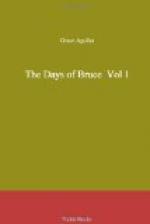conflagration within the court spread faster and nearer
every moment, and from the blazing rafters and large
masses of thatch caught by the wind and hurled on
the very wall, done greater and more irreparable mischief
than the combustibles themselves. Up, up, seeming
to the very heavens, the lurid flames ascended, blazing
and roaring, and lighting the whole scene as with
the glare of day. Fantastic wreaths of red fire
danced in the air against the pitchy blackness of the
heavens, rising and falling in such graceful, yet
terrible shapes, that the very eye felt riveted in
admiration, while the heart quailed with horror.
Backwards and forwards gleamed the forms of men in
the dusky glare; and oaths and cries, and the clang
of swords, and the shrieks of women, terrified by
the destruction they had not a little assisted to
ignite—the sudden rush of horses bursting
from their stables, and flying here and there, scared
by the unusual sight and horrid sounds—the
hissing streams of water which, thrown from huge buckets
on the flames, seemed but to excite them to greater
fury instead of lessening their devouring way—the
crackling of straw and wood, as of the roar of a hundred
furnaces—these were the varied sounds and
sights that burst upon the eye and ear of Nigel, as,
richly attired as he was, his drawn sword in his hand,
his fair hair thrown back from his uncovered brow
and head, he stood in the very centre of the scene.
One glance sufficed to perceive that the rage of the
men-at-arms was turned on their treacherous countrymen;
that the work of war raged even then—the
swords of Scotsmen were raised against each other.
Even women fell in that fierce slaughter, for the
demon of revenge was at work, and sought but blood.
In vain the holy abbot, heedless that one sudden gust
and his flowing garments must inevitably catch fire,
uplifted his crosier, and called on them to forbear.
In vain the officers rushed amidst the infuriated
men, bidding them keep their weapons and their lives
for the foe, who in such a moment would assuredly be
upon them; in vain they commanded, exhorted, implored;
but on a sudden, the voice of Sir Nigel Bruce was
heard above the tumult, loud, stern, commanding.
His form was seen hurrying from group to group, turning
back with his own sword the weapons of his men, giving
life even to those who had wrought this woe; and there
was a sudden hush, a sudden pause.
“Peace, peace!” he cried. “Would
ye all share the madness of these men? They have
hurled down destruction, let them reap it; let them
live to thrive and fatten in their chains; let them
feel the yoke they pine for. For us, my friends
and fellow-soldiers, let us not meet our glorious
fate with the blood of Scotsmen on our swords.
We have striven for our country; we have striven gloriously,
faithfully, and now we have but to die for her.
Ha! do I speak in vain? Again—back,
coward! wouldst thou slay a woman?” and, with
a sudden bound, he stood beside one of the soldiers,
who was in the act of plunging his dagger in the breast
of a kneeling and struggling female. One moment
sufficed to wrench the dagger from his grasp, and
release the woman from his hold.




